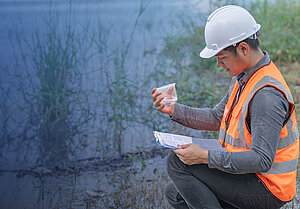Water Resources Certificate Program

The water resources certificate is an interdisciplinary program for undergraduate students in their junior and senior years, focusing on water’s journey and impact to the environment. The certificate requires 12 credits across key areas in hydrology fundamentals, soil and water contaminants management, and technological advances in water management. The program aims to equip students with the skills to tackle water resources challenges effectively.
Program Description
The Water Resources Certificate Program will require students to take 12 credits of courses from a total of 26 courses (79 credits), which are grouped in three categories (hydrology, soil and water quality, and technology). Through this program, students will be trained to manage the limited water resources for maximum beneficial uses. The Water Resources Certificate will prepare the students to enter careers in hydrology and water resources management.
Program Requirements
The Water Resources Certificate requires completing a minimal 4 courses (12 credits) from 26 upper-division courses across three areas, with a “C” or better in each and an overall GPA of at least 3.0 to qualify for the certificate.
| Hydrology | Soil and Water Quality | Technology |
|---|---|---|
|
|
|
Enrollment Requirements
A student pursuing an undergraduate certificate must be enrolled as a degree-seeking student at NDSU. Undergraduate certificates are not awarded prior to the award of an undergraduate degree. A student already holding an undergraduate degree may pursue an undergraduate certificate as a nondegree-seeking graduate student.
Career Outlook
As a land-grant institution, North Dakota State University (NDSU) is dedicated to serving the state and region through education, service, and research. The ND Water Resources Research Institute aims to address two primary goals: training a skilled workforce and assisting the state in solving critical water-related issues. Recognizing the gap in qualified professionals in water resources, the Water Resources Certificate program is designed to prepare students for careers in this vital field, offering a direct link between education and employment.
This program is particularly relevant for students pursuing degrees in Civil, Construction, and Environmental Engineering; Agricultural and Biosystems Engineering; Natural Resources Management, and other related fields. By completing the certificate, students become attractive candidates for roles in state agencies and consulting firms specializing in water resources, with opportunities ranging from paid internships to permanent positions.
NDSU's initiative not only responds to the immediate workforce needs of North Dakota's state agencies but also contributes to the broader goal of managing and preserving water resources efficiently. This strategic alignment with the state's needs underscores the university's commitment to its land-grant mission, facilitating a bridge between academic preparation and practical application in the workforce.


